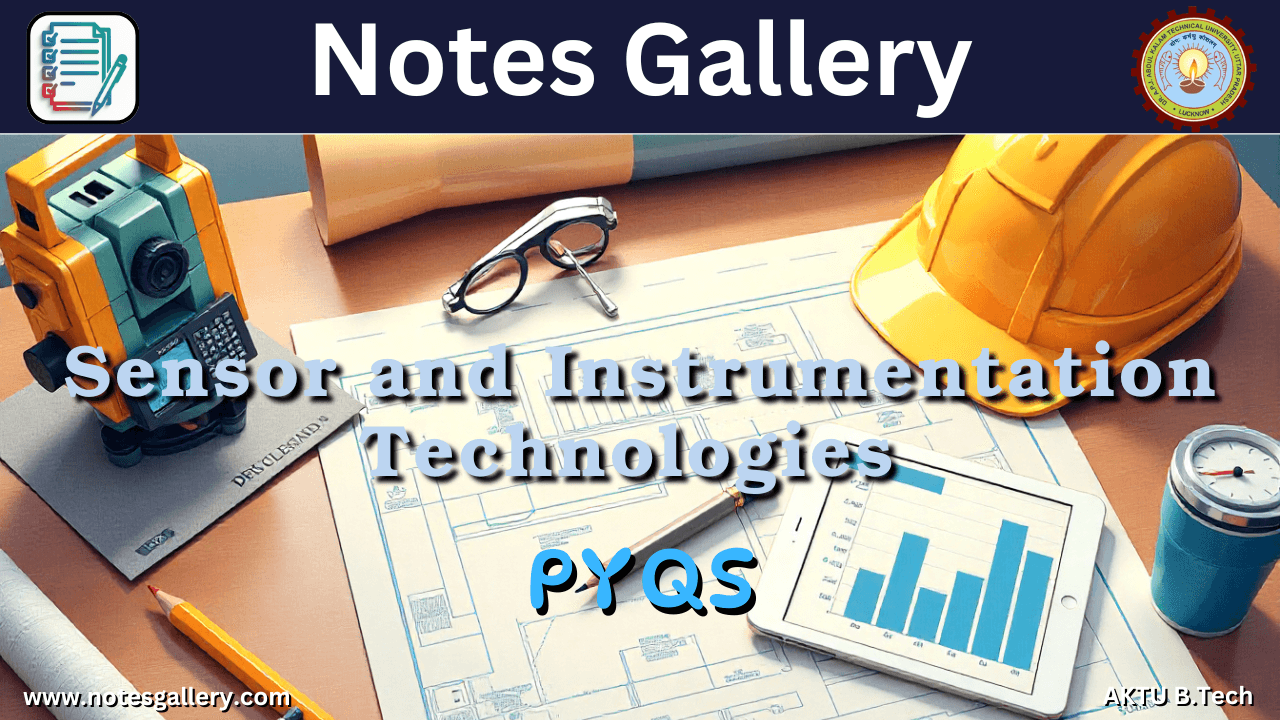Sensor and Instrumentation Technologies for Civil Engineering Applications is an important subject that introduces students to advanced monitoring systems used in modern infrastructure. From structural health monitoring to environmental data acquisition, sensors allow civil engineers to design, analyze, and maintain projects with greater accuracy. For AKTU students, understanding this subject becomes far easier with access to Civil 3rd Year AKTU PYQS (Sensor and Instrumentation Technologies for Civil Engineering Applications), as PYQs help identify repeated topics, writing patterns, and the level of conceptual clarity needed to score well.
Click Links given below for notes/Imp. Question/PYQs
https://notesgallery.com/aktu-b-tech-1st-year-free-study-materials/ First Year
https://notesgallery.com/aktu-b-tech-2nd-year-free-study-materials/ Second Year
https://notesgallery.com/aktu-b-tech-3rd-year-free-study-materials/ Third Year
https://notesgallery.com/aktu-b-tech-4th-year-free-study-materials/ Fourth Year
Why This Subject Matters in Civil Engineering
Civil structures today must withstand increasing loads, unpredictable climate patterns, and long-term environmental stress. This is why sensors play a major role in highways, buildings, dams, bridges, tunnels, and water treatment systems. The Civil 3rd Year AKTU PYQS (Sensor and Instrumentation Technologies for Civil Engineering Applications) clearly reflect how the subject blends electronics with practical engineering. Students learn how instruments measure parameters such as strain, stress, displacement, pressure, velocity, water level, and temperature. These topics appear repeatedly in exam papers, highlighting their importance.
Commonly Asked Topics Seen in PYQs
A study of previous year papers shows that AKTU regularly asks for definitions, classifications, working principles, and applications of sensors. The Civil 3rd Year AKTU PYQS (Sensor and Instrumentation Technologies for Civil Engineering Applications) reveal recurring questions on strain gauges, LVDT, load cells, piezoelectric sensors, temperature sensors, proximity sensors, accelerometers, and vibration monitoring systems. Questions about data acquisition systems, signal conditioning, calibration, and instrumentation errors also occur frequently. Students who focus on these areas often perform well because most theoretical questions come directly from these core concepts.
Understanding Strain Gauges and Their Relevance
Among all sensors, strain gauges are the most frequently asked topic in PYQs. The Civil 3rd Year AKTU PYQS (Sensor and Instrumentation Technologies for Civil Engineering Applications) show repeated questions about gauge factor, Wheatstone bridge circuits, bonding materials, and strain measurement applications. Students need to understand how strain gauges help assess deformation in beams, columns, pavements, and steel structures. Exam answers become stronger when supported with neat diagrams and examples.
Instrumentation Systems in Civil Engineering
Instrumentation technology includes not only sensors but also data loggers, signal conditioners, amplifiers, and software tools. According to Civil 3rd Year AKTU PYQS (Sensor and Instrumentation Technologies for Civil Engineering Applications), AKTU often asks: “Explain the components of an instrumentation system,” “Describe data acquisition,” and “Write short notes on signal conditioning.” Students must be able to explain how raw sensor output is cleaned, filtered, amplified, stored, and monitored for analysis. Understanding these steps ensures full marks in long-answer questions.
Applications of Sensors in Structural Health Monitoring
One of the most important themes in PYQs is structural health monitoring. Students are asked how sensors detect cracks, vibrations, settlement, and corrosion in bridges, buildings, and dams. The Civil 3rd Year AKTU PYQS (Sensor and Instrumentation Technologies for Civil Engineering Applications) highlight questions about fiber optic sensors, ultrasonic testing, non-destructive testing, and vibration measurement. Since modern civil engineering heavily depends on these technologies, AKTU uses them frequently in exam papers.
Environmental Monitoring and Field Applications
PYQs also feature questions about monitoring environmental parameters like humidity, air quality, water turbidity, rainfall, and groundwater level. Remote sensing-based sensors and IoT-based monitoring techniques are also gaining importance. The Civil 3rd Year AKTU PYQS (Sensor and Instrumentation Technologies for Civil Engineering Applications) indicate increasing interest in smart city applications such as smart drainage systems, real-time flood monitoring, and automated traffic management. Students who prepare examples for each category are likely to perform better in exams.
Advantages and Limitations of Sensors
Several PYQs ask students to compare different types of sensors and explain their benefits and limitations. For example, piezoelectric sensors provide excellent accuracy, but they are expensive. Strain gauges are simple and cost-effective but require careful installation. The Civil 3rd Year AKTU PYQS (Sensor and Instrumentation Technologies for Civil Engineering Applications) show that these comparisons help examiners judge a student’s depth of understanding. Writing clear, concise points and supporting them with examples leads to higher scores.
How PYQs Help Improve Exam Performance
PYQs are essential because they highlight repeated questions, commonly tested concepts, and important diagrams. Practicing Civil 3rd Year AKTU PYQS (Sensor and Instrumentation Technologies for Civil Engineering Applications) allows students to see how AKTU frames theory-based questions. It also teaches how to present answers with proper headings, neat diagrams, and examples. Students who practice PYQs are better prepared to handle both short and long questions, making the subject easier and more scoring.
Final Preparation Tips for Students
Students should revise all major sensors, their construction, working principles, applications, and limitations. Preparing short notes on LVDT, strain gauges, load cells, accelerometers, and vibration sensors is highly useful. The Civil 3rd Year AKTU PYQS (Sensor and Instrumentation Technologies for Civil Engineering Applications) show that clarity of concepts and clean diagrams are essential. Regular revision and practicing PYQs before exams help boost confidence and secure strong marks in this subject.
